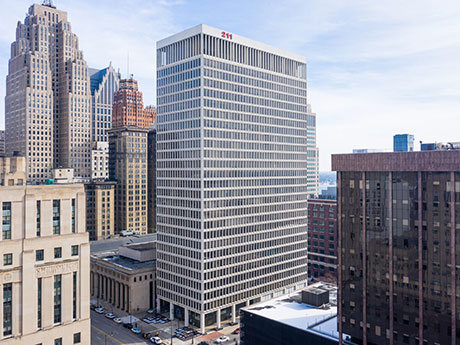By Andy Gutman, Farbman Group
Until recently, the post-pandemic headlines and trend lines have been clear: the office market is struggling. Lower volumes and businesses closely evaluating their operational models and space needs in the wake of a COVID-altered world have prompted concerned conversations about what’s next for an evolving office sector.
Here’s the good news, however: the Detroit office landscape reflects a changing narrative around not only the commercial climate, but the entire city of Detroit.

To be clear, the office resurgence in Detroit has been modest, and is clearly still in its early stages. Whether you are entering a recession or starting a recovery, there is always a transitional period where sector activity is starting to change before the shift becomes impossible to deny.
Motown momentum
While the understandable indecision and uncertainty of the last few years has led to some stagnation in the office space, many of the COVID-era lease expirations seem to have resolved and activity has been gradually, but steadily, picking up in the last six to 12 months. Decisions are being made and lease volume is trending up — but deals and leases are moving slower, are taking longer to get done and we are still seeing a lot of shorter-term leases.
Growing numbers of decision makers seem to be concluding that they do need some kind of office presence. Property tours are up dramatically in our office buildings. Some companies are still working to determine post-pandemic space needs, but with much of the backup of COVID-influenced decision making that was clogging the pipeline apparently winding down, things seem to be moving in the right direction.
Priorities, amenities
While desire for amenities is still high, it’s apparent given the valuation changes that office owners/landlords may not have the funds or are reluctant to provide the funds to do the high-end tenant improvements that a lot of prospective tenants are looking for.
Brands and businesses that have been holding off on doing deals as they negotiate a higher-end tenant improvement package seem to be recognizing that landlords will pitch in but are unlikely to put big money into office at a time when it’s still the most distressed sector. Tenants are coming around to the idea that they may have to come out of pocket if they want to get the office of their dreams.
Size variability
While there has been a lot of talk about downsizing, much of the post-COVID adjustment has apparently already played out and the reality on the ground in Detroit seems to be much more of a mixed bag when it comes to square footage needs. There are always some sectors growing and others looking to be more efficient or embrace a smaller, remote-first concept that requires less space. But there seems to be a fairly even balance at the moment between expansion, staying put and consolidation.
Tenants, trends
In Detroit, tech companies, medical and private educational users like nursing schools are driving some level of expansion. That said, leasing activity tends to defy any one group or sector. Across the board, everybody is making decisions on their individual needs. If there is a connective thread between companies signing leases, it seems to be the growing push for culture and collaboration that is almost impossible to replicate in a remote work environment.
Downtown looking up?
While some downtown office markets across the Midwest have borne the brunt of the post-COVID slowdown, Detroit has been comparatively resilient. The city’s much-celebrated renaissance has increased downtown walkability and livability and generated the kind of mixed-use activity that has enduring appeal. Detroit also didn’t overbuild and was not saddled with an existing oversupply. Consequently, the Motor City has held up incredibly well, especially compared with some other Midwest markets.
Detroit’s positive image and status as a national darling and a hot destination for families and businesses has also helped — and downtown has clearly benefited from an unusual degree of civic coordination and political collaboration between local, county and state leaders. A positive and constructive focus on getting things done has improved services and infrastructure and helped keep downtown Detroit comparatively clean and safe.
Outside of the central business district, there are a number of growing neighborhoods where activity is high. Bagley Woodbridge, West Village, Indian Village and places like Milwaukee Junction in the North End (to name a few) are all thriving. Corktown also remains hot — and Midtown Detroit in general looks to be a hotbed of economic activity in the future, with dozens of development deals in the hopper and an influx of billions of investment dollars from Henry Ford, Michigan State and others.
Looking ahead
In the near term, it may be instructive to keep an eye on office rental rates when assessing how durable the office recovery in Detroit will be. Unlike some other Midwest cities, we’ve seen rates hold fairly steady.
Longer term, the success of metro Detroit’s office market may be most impacted by the potential influx of a sizable number of startups and technology companies. With innovative programs like Oakland County teaming with startup businesses to provide them with 3D printing tech, and civic support for startup incubators in the market, there is very real public and private momentum behind a push for Detroit to become a key destination for growing tech companies.
Southeast Michigan may not become the next Silicon Valley, but with iconic brands like Ford going all-in on tech (even referring to itself as a tech company) and DTE actively working to level-up the regional power grid, the dream of Motown attracting more talent and being viewed as a legitimate tech hub may be much closer than many may realize.
The bottom line is that Detroit isn’t in recovery anymore — it’s in growth mode and is recognized across the nation and the world as somewhere people and businesses want to be. In that context, these early signs of office momentum may be just the beginning of something very exciting in the months and years to come.
Andy Gutman is president of Farbman Group. This article originally appeared in the July 2024 issue of Heartland Real Estate Business magazine.


